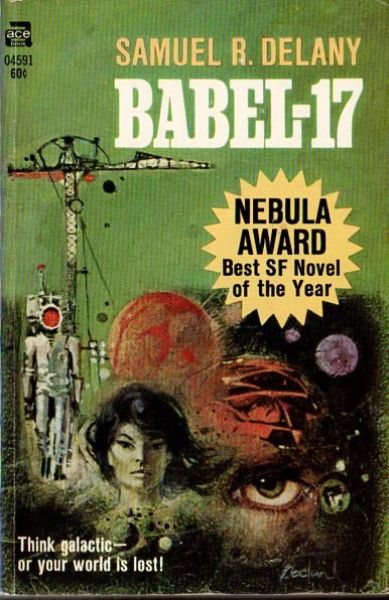Strange Language
Babel-17
By Samuel R. Delany

4 Feb, 2018
1966’s Babel-17 is an SF novel by Samuel R. Delany. Not his first (he had already published a number of Ace Doubles and one standalone), but the one that made his name. It shared the Nebula with Flowers for Algernon and was nominated for the Hugo as well, losing to The Moon is a Harsh Mistress. It shares some elements of its setting with an earlier Delany novel, Empire Star.
Victory over the Invaders may depend on understanding a series of indecipherable messages broadcast in an odd code? cipher? language? that the authorities label Babel-17. The Alliance turns to noted linguist Rydra Wong. “Tell us what this is and tell us what it means!”
There’s a correlation between Babel 17 broadcasts and acts of sabotage. Perhaps the invaders are signalling instructions to their agents in the field?
But that’s not quite what’s going on. The invaders have weaponized language; anyone who learns Babel-17 will find their thoughts controlled by the worldview baked into the language. If Rydra learns Babel-17, she may become a tool of the invaders too.
~oOo~
Early 20th century anthropologists were broadly receptive to ideas now known as grouped together as the Sapir-Whorf hypothesis . Language gives people the tools to name and understand the world; to the extent that different languages cut up the world in different ways, people are primed to see the world in those ways. Some anthropologists and linguists saw language as determining thought; others saw it as influencing thought. The notion is much less popular these days, as there proved to be little experimental evidence for determinism, though some for influence. The hypothesis was popular in its time and has inspired not just one, but at least two SF novels. Suzette Haden Elgin’s Native Tongue imagines a language that, once learned, undermines the patriarchy.
You may not believe in the Sapir-Whorf hypothesis, but it has inspired two quite readable novels. If we’re going to accept FTL travel, wormholes, ansibles, telepathy, etc. for the sake of the story, we might as well accept this hypothesis for the duration of the novel.
Babel 17’s galaxy is heterogeneous. Unlike so many of US SF’s galactic settings, settings blandly uniform and inhabited by thinly-disguised Southern Californians with no political differences at all, the Alliance encompasses several species. Even its human populations belong to a range of cultures and accept a variety of behaviours. Customs differ between occupations: what’s normal for government functionaries is not the norm for spacers. Members of the Alliance may not always enjoy the diversity; there’s a lot of grudging toleration garnished with thinly disguised judgments. That may not seem like such a great accomplishment but … turn on the real-world news if you want to see what rampant xenophobia looks like.
Perhaps it takes an outsider like Delany to imagine diversity … and imagine how it might work in a galactic setting.
I liked the setting. I was less thrilled with the plot, which seemed both thrilleresque and slight. As well, the characters seemed a bit thin. However, this is quite a short novel and I may have been spoiled by more than fifty years of an increasingly diverse SFF field; what seems humdrum now was something worth celebrating back then.
Does the book still resonate for you? Tell me about it in comments.
Babel 17 is available here (Amazon) and here (Chapters-Indigo).
